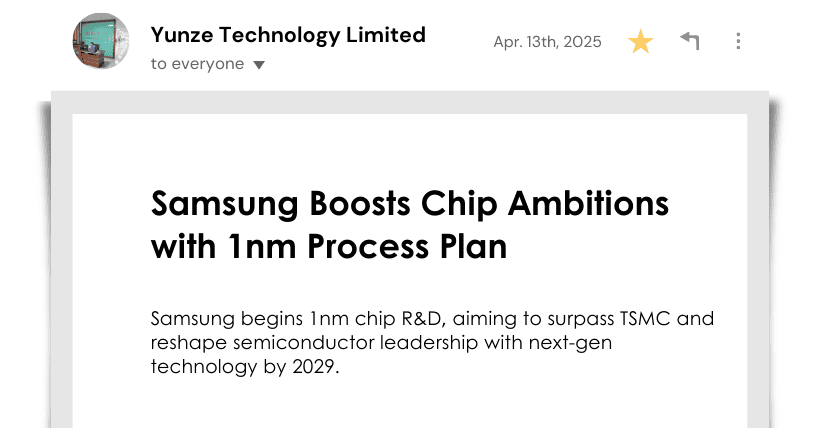Samsung Electronics has begun developing the 1nm (foundry process, known as the dream semiconductor process). Due to a current gap with TSMC in near-commercialized technologies like the 2nm process, Samsung plans to create a breakthrough opportunity by accelerating the development of the future-oriented 1nm process.
According to industry insiders on April 9, Samsung Electronics’ Semiconductor Research Institute recently started R&D for the 1nm process. A project team has been formed by recruiting researchers who participated in advanced process development such as 2nm. The 1nm process is referred to as the dream semiconductor process, and the most advanced process revealed so far in Samsung’s foundry roadmap is the 1.4nm process, which is scheduled for mass production in 2027.
The 1nm process requires new technological concepts that break away from existing design patterns, as well as next-generation equipment such as high-NA EUV lithography tools. The company aims to achieve mass production after 2029.
Samsung Electronics currently lags behind TSMC in both the already mass-produced 3nm process and the 2nm process scheduled for mass production this year, so expectations for the 1nm process are high. In the case of the 2nm process, TSMC’s yield has already surpassed 60%, showing a considerable gap with Samsung. In particular, it is reported that last month Chairman Lee Jae-yong urged executives to “inherit the tradition of technology leadership” and emphasized the need to “create the future with technology that doesn’t exist in the world,” which led to the early launch of 1nm process development.
Competitors are also accelerating the development of 1nm-class processes. In April last year, TSMC unexpectedly announced the addition of the 16A technology (1.6nm) between the existing 1.4nm and 2nm, and plans to start mass production in the second half of 2026. This move is analyzed to be aimed at meeting the rapidly changing technological demands of the AI semiconductor market while laying the foundation for next-generation processes.
Samsung’s foundry division, which recently underwent a leadership reshuffle, is striving to enhance technical capabilities and expand its business ecosystem. Han Jin-man, Head and President of Samsung Electronics’ Foundry Business, has recently been working to strengthen partnerships, meeting with Korean AI semiconductor startups including DeepX to understand customer needs.
Related:
- 5D Method for Solder Paste Selection in PCBA Process
- Key SMT Printing and Reflow Soldering Procedures Guide
- 100 Tips of Essential Knowledge for Chip Manufacturing Pros
- Dummy vs Test vs Production Wafers and Their Roles
- Why Are Semiconductor Wafers Tilted in Implantation?
- ECO During Tape-Out: What Engineers Need to Know
- 1.4nm Wafer Costs Unveiled — A Staggering ¥323K
- Semiconductor Bevel Etch: Key Details You Must Know
- Prevent Solder Ball Defects in PCBA Manufacturing
- Discover the Full Range of FAB Job Positions Explained
- CMOS Technology: Reasons for P-Type Wafer Choice

Disclaimer:
- This channel does not make any representations or warranties regarding the availability, accuracy, timeliness, effectiveness, or completeness of any information posted. It hereby disclaims any liability or consequences arising from the use of the information.
- This channel is non-commercial and non-profit. The re-posted content does not signify endorsement of its views or responsibility for its authenticity. It does not intend to constitute any other guidance. This channel is not liable for any inaccuracies or errors in the re-posted or published information, directly or indirectly.
- Some data, materials, text, images, etc., used in this channel are sourced from the internet, and all reposts are duly credited to their sources. If you discover any work that infringes on your intellectual property rights or personal legal interests, please contact us, and we will promptly modify or remove it.








